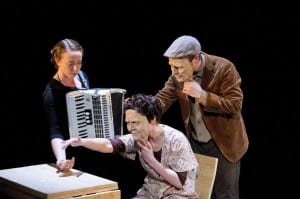Theatre Ad Infinitum

Theatre Ad Infinitum are a multi-award-winning international theatre company who specialise in physicalizing performances. Their aim is to produce performances which “move, challenge and inspire” ((Theatre Ad Infinitum (2013) ‘About Us’. (Accessed 30 January 2013) Available at: http://www.theatreadinfinitum.co.uk/)) audiences of all cultures and nationalities.
“We all share a passion for innovative theatre making that speaks to a global community, and create performances that harness the universal language of the body” ((Theatre Ad Infinitum (2013) ‘About Us’. (Accessed 30 January 2013) Available at: http://www.theatreadinfinitum.co.uk)).
This theatre company interests us because of their use of physical theatre, mask work and mime, which has developed their ability to captivate an audience without speaking. They have mastered the art of story telling without using words. In order to create a spectacle worthy of a storybook, the way in which our theatre company presents our story is vital. We can take inspiration from this company because of their unique methods of captivating an audience.
‘“The Lecoq-trained mime ensemble Theatre ad Infinitum have moved to the front of the pack, their vivid mix of theatre, clowning and storytelling gaining them critical acclaim” – The Guardian’ ((Theatre Ad Infinitum (2013) ‘Awards & Reviews’. (Accessed 30 January 2013) Available at: http://www.theatreadinfinitum.co.uk)).
On Thursday 14th February 2012, Theatre Ad Infinitum performed their production of Translunar Paradise at the Lincoln Drill Hall, which was both incredibly moving and inspiring. This production used mask-work and live music to produce a sensual and emotive performance, which highlighted its themes of loneliness, grief and love. “Translunar Paradise takes you on a journey of life, death, and enduring love. After his wife passes away, William escapes to a paradise of fantasy and past memories, a place far from the reality of his grief. Returning from beyond the grave, Rose revisits her widowed companion to perform one last act of love: to help him let go. Using a live accordion accompaniment, this exquisite piece of mask and movement theatre was a critically acclaimed sellout at the Edinburgh Festival Fringe 2011” ((Lincoln Drill Hall (2012) ‘Theatre Ad Infinitum’. (Accessed on 30 January 2013) Available at: http://www.lincolndrillhall.com/events/theatre-ad-infinitum-translunar-paradise)).
The way in which this piece highlights its emotional themes through music and movement are techniques which our theatre company might hope to replicate in our own performances.
Kate Dawson
Word Count: 373
Works Cited
